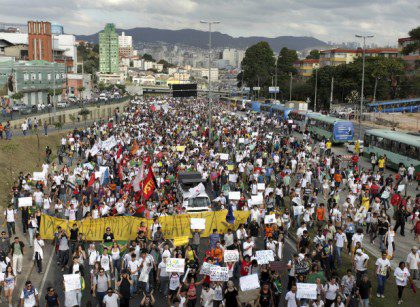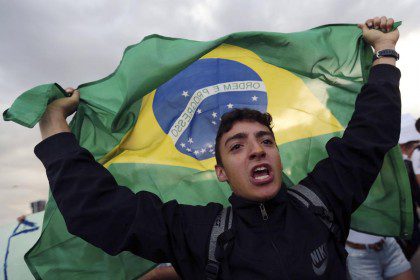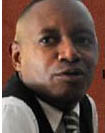
A protest movement that began in mid-June is spreading throughout the major cities in Brazil. Initially organized to protest increases in bus, train and metro ticket prices, concerns now include the need for better health and education services and an anger toward a sense of corruption in government.
Fr. Stefan Tertünte, an SCJ from the German Province, recently interviewed Fr. Gilberto Heleno, SCJ, about the movement. A member of the Central Brazilian Province, Fr. Gilberto has done advanced studies in social communication. He has an undergraduate degree in business administration, as well as a master’s degree in systematic philosophy from the Gregorian Pontifical University in Rome. Fr. Gilberto is currently a professor of philosophy at the SCJs seminary in Taubaté, Brazil.
The following is a paraphrased translation of Fr. Stefan’s interview:
Question: Have you been surprised by the protest movement or did you have a sense that something like this might happen?
Answer (Fr. Gilberto): The protest movement has surprised all of Brazil. Nobody expected that a minor rate increase of 20 centavos (less than nine cents in U.S. currency) in bus fares would drive thousands of people to the streets. But as the protesters themselves emphasize, it is not only the money but the indifference of the political class in the face of the Brazil’s real problems which include rampant corruption; the abysmally poor quality of public services, especially in health care; violence in the big cities; and the amount of money that many feel is being wasted by building huge stadiums for the World Cup in 2014.
Q: Who are the protestors?
A: For the most part they are young people. If things go on as before, it is their future that is threatened irretrievably. The movement includes many students, professionals and artists. The media classifies them as a “middle class,” neither very poor nor very rich.
Q: In a country with constant economic growth, why would these protests be coming from the middle class?
A: Yes there is economic growth, but that was seriously shaken by the international financial crisis. The former president, Lula, said that the crisis was not a tsunami, but only a little rain in summer. Yet, the facts show otherwise. Today Brazil is afraid of the return of the dual problem that previously plagued Brazilians: high inflation and low industrial growth. If published figures are to be believed, the current economic growth is barely measurable, and the prospects are not good. Brazilians on the street are demanding changes because economic growth alone is not enough. There must be a new sense of ethics among politicians and a greater care by the government for its citizens.
Q: What does the Church say about the protest movement?
A: The CNBB – National Conference of Bishops of Brazil – released a statement saying that they support the right of every citizen to protest, especially for changes that could improve the lives of all. However, the bishops also noted that the protests must take place in a climate of respect and peace without violence and vandalism.
Q: Seen through Dehonian eyes, what do you make of this movement?
A: It is time that the Brazilians react to a political class that thinks only of its own power. Even now, the whole political power of both the government and of the opposition is focused on the next presidential elections in 2014! The demonstrations come at an appropriate time and show the Brazilian politicians that there is great dissatisfaction with the performance of them all, with rare exceptions.
As Dehonians, I think we should follow the same position as the bishops: support the demonstrations and the right of citizens to publicly express their political grievances, but without violence and vandalism. One of the great challenges of Brazilian society is social injustice. In our country there are realities that are worthy of a developed country, but also situations of great misery and poverty that scream to us. As Dehonians we must advocate that there is only peace with justice.
Q: Have SCJs (Dehonians) participated in the protests?
A: I know of some members who have published their opinions on social media sites. That is the extent of SCJ involvement as far as I know.
Q: Are you among those who have made your opinions known?
A: Yes, through social networks, especially on Twitter. It is necessary to recognize that ten years of a leftist government did give Brazil a more just society with social policies that brought thousands of people out of poverty. It brought forth a way of doing politics that benefited the greatest mass of society. My Twitter comments are demonstrations, in a sense, that yes, I am saying that we need a change in direction, a new way of doing politics but without an overthrow of President Dilma Rousseff as some have suggested.
Q: Was the statement from the president a good sign?
A: President Dilma Rousseff’s speech was well rated by political commentators. There was pressure on her to take a position. Today (June 24), she surprised everyone when she suggested five major proposals in response to the demonstrations. Among them was to hold a national vote to see if the Brazilians want a representative assembly to process political reforms. In my view, the proposals of the president are useful, but the eternal struggle between the government and the opposition has already poisoned the debate, and many consider the proposals to be unconstitutional. This shows the great difficulty of the political class to demonstrate a solution to the problems of the people. And that’s why people go to the streets to press for a new style of politics. But the politicians do not learn!

Q: No political party or institution seems to be participating in the demonstrations. Has there been a failure of civil institutions such as political parties, churches and trade unions?
A: This is the great unknown of this movement: how can a dialogue occur when the dialogue partners are missing? The MLP (Movimento Passe Livre) that started the demonstrations has some leaders who are close to the political left. The vast majority of demonstrators, however, are simply in revolt against the ruling political class. They expect nothing from them because they have found that the politicians deal less with the huge problems of the population, but instead only with maintaining power.
Q: Will Brazil be different because of these protests?
A: Yes, it is a scream that has been stuck in the throat! Who would have thought that demonstrations coming from the people, without any political or institutional organization, would lead to a reduction in bus fares, and more so, impact the affairs of the presidency?
Q: How will the protests impact the upcoming World Youth Day?
A: Personally, I’m concerned. In the social context in which we are living today in Brazil we will need to redouble security, even asking the help of the army. How do we take care of the security of a mass event when the masses are rebelling?
Q: On YouTube there is a famous video of a young student, Clara Daudén, speaking about the causes of the protests in Brazil. Do you agree with the student’s analysis?
A: I saw it and realized that she is absolutely right. With so many urgent things to do in Brazil, it is revolting that so much money is put into the construction of stadiums for the World Cup, which then turn into large “white elephants.”
The people refuse to just watch. They want to participate in what is going on, if not on the street, then on the internet so that the whole world can know of their dissatisfaction and frustration.


